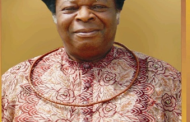Another rift is unfolding in the Nigerian oil sector, two months after President Muhammadu Buhari ‘reconciled’ Dr. Ibe Kachikwu, the Minister of State for Petroleum with Dr Maikanti Baru, the Group Managing Director of the Nigerian National Petroleum Corporation, (NNPC). The Minister had hit the president with a petition alleging infractions by the NNPC boss. In the end, the president reportedly told the Minister and the GMD to go and work together without rift and doubt or words to that effect. Shortly after, Dr Kachikwu not only reclassified the subject matter of his petition against Dr Baru as a governance rather than a corruption issue, he was also in a total amity after a vigorous hand shake with Dr. Baru at the 23rd Nigerian Economic Summit Group function last October in Abuja.

Dr Kachikwu and Dr Baru @ the NESG function last October
Two months after that rift, another one is unfolding, bringing out more clearly the power struggle underpinning the on-going fuel supply crisis across Nigeria. This time, however, the drama is featuring the Depot and Petroleum Products Marketers Association (DAPPMA) which has punctured the claim of the Federal Government in blaming the marketers for the situation. The Depot and Petroleum Products Marketers Association (DAPPMA) is, rather, pointing at struggle for the control of the oil business as the source of all the chaos of the past few weeks. It said in a statement yesterday that the situation is traceable to the reversal of the structural arrangement whereby “DAPPMA members import about 65 per cent of the nation’s total fuel consumption, Major Oil Marketers Association of Nigeria (MOMAN) imports about 15 per cent and PPMC/NNPC import the balance of 20 per cent”. By this analysis, the current crisis arose when the NNPC assumed the role of the sole importer of PMS into the country since October, pointing out how a crisis of distribution always manifest any time NNPC assumes such role of being sole importer because marketers rather than the NNPC “own 80 per cent of the functional receptive facilities and retail outlets in Nigeria”.
According to the analysis of Olufemi Adewole, DAPPMA’s Executive Secretary who issued the statement, the issue in question is not whether NNPC has sufficient stock of fuel but whether the stock are in the tanks of the independent marketers ready for distribution to the consumers. In other words, while NNPC might be correct to say that there are sufficient products, that speaks not to availability of the products to the ordinary Nigerian consumers.
The statement which sought to put the records straight emphasised the lie in heaping any blames on the marketers. “While all kinds of allegations have been made in the media, it is important to set the records straight, as Nigerians first and as responsible business men and women who employ Nigerians”. Dismissing blaming of marketers for hoarding, Adewole said the members were aware that “Hoarding is regarded as economic sabotage and we assure all Nigerians that our members are not involved in such illicit act”. The Executive Secretary indicated readiness of the members of the association to do what he called “24-hour loading to alleviate the sufferings of Nigerians and for the fuel queues to be totally eliminated”.
The question which follows this contention is why the NNPC might have taken over as sole importer since last October. It might have a plausible reason for taking over but why did Boss Mustapha, the Secretary to the Government of the Federation point accusing fingers at independent marketers?
Some analysts point out that oil is about big money. So, it is always the theatre of all manner of tussles for control of the rents paid on it. “The struggle for that control is the source of all the chaos, corruption and conflict oil generates, especially in Nigeria”, a close observer of the oil sector told Intervention. And he goes on to argue a peculiarity in the case of oil in Nigeria in how successive Nigerian governments declare neoliberal business model but they are still unable to take off their hands from control of such structures as the NNPC, for instance.




























